Paste Power Rankings: The 5 Best TV Shows Right Now, from Agents to AEW Dynamite
Illustration by Christine Fernando and Soleil Collins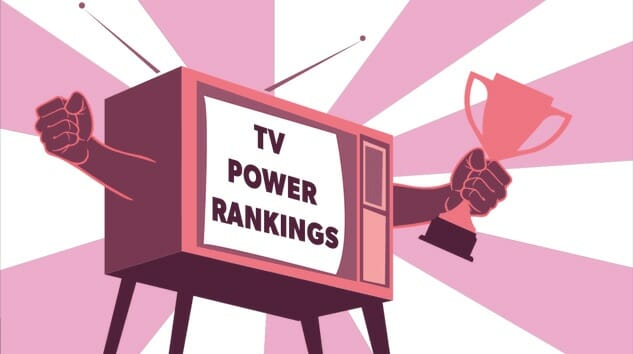
The summer TV season has found ways to supplement the relative lack of new series with reunions for old ones. Endless Zooms of beloved casts have been appearing all over social media, especially during ComicCon@Home this past week. Few have been as lovely as seeing the Happy Endings cast reunite, though (although our own contributor Jacob Oller hosting a SDCC panel was definitely a TV highlight).
Not all reunions are created equal, though, as a disappointing return for 30 Rock stripped it of its satirical teeth and instead played out as a commercial for Peacock.
There are still some shows we can count on to deliver pointed commentary on the state of t he industry though, like Comedy Central’s Corporate, which returned for its third season last week. According to Paste contributor Whitney Freidlander, it took on “streaming services, binge culture and (as an added bonus for the parents in the group) those super annoying animated kids videos that are actually generated by a computer algorithm.”
The rules for the Power Rankings are simple: Any current series on TV qualifies, whether it’s a comedy, drama, news program, animated series, variety show or sports event. It can be on a network, basic cable, premium channel, Netflix, Amazon, Hulu, YouTube or whatever you can stream on your smart TV, as long as a new episode was made available the previous week (ending Sunday) —or, in the case of shows released all at once, it has to have been released within the previous four weeks. The voting panel is composed of Paste Editors and TV writers with a pretty broad range of tastes.
Honorable Mention: Corporate (Comedy Central), The Capture (Peacock), Doom Patrol (DC Universe), I May Destroy You (HBO)
5. P-Valley
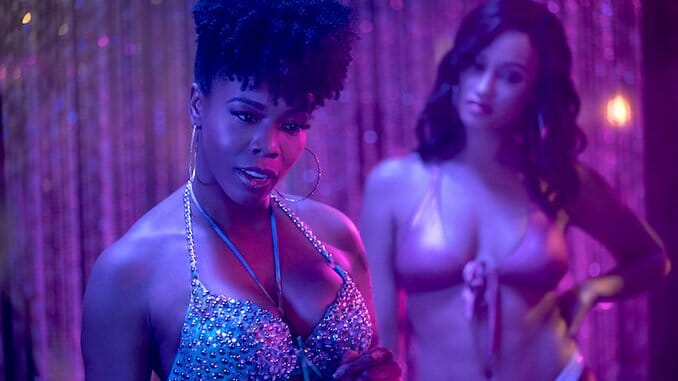
Network: Starz
Last Week’s Ranking: Honorable Mention
This Week: An all-time Uncle Clifford episode.
P-Valley takes place at a strip club deep in the Mississippi Delta and deals with the tough personalities who both run it and frequent it, but the show’s visual language is deeply feminine. Created and written by Olivier Award-winning playwright Katori Hall (based on her play, “Pussy Valley”), the eight-episode first season is also directed exclusively by women. And like Lorene Scafaria’s Hustlers, you can feel it.
The regulars of The Pynk are introduced to us fully formed: Mercedes (series’ breakout Brandee Evans) is the club’s star dancer, a tour de force who is ready to retire and start her own gym for girls; Uncle Clifford (Nicco Annan), the colorful owner who manages to dress more outrageously than any of his bejeweled dancers, is struggling to keep the club afloat; Keyshawn, a.k.a. Mississippi (Shannon Thornton) is a beauty on the rise but with an abusive partner; and a newcomer, Autumn Night (Elarica Johnson), is running from a traumatic past and looking to find her place among this odd family.
It’s easy to feel connected to P-Valley’s overall world and want the best for the women (and occasional men) who are trying to live on their own terms amid the neon lights and trap music bass lines. There’s also a naturalism to this rare, true working-class show that imbues it with a sly humor, like using funeral home bricks meant to pad out arrangements for a bag full of cash, or razzing the club’s cook for making chicken wings that give the dancers’ gas. P-Valley wants you know to know this place and the people who call it home in intimate ways—and not always through sex. P-Valley may or may not be the next Power, but it deserves to be; what it adds to the TV landscape is fresh, raw, and provocative in all of the right ways. —Allison Keene
4. AEW Dynamite
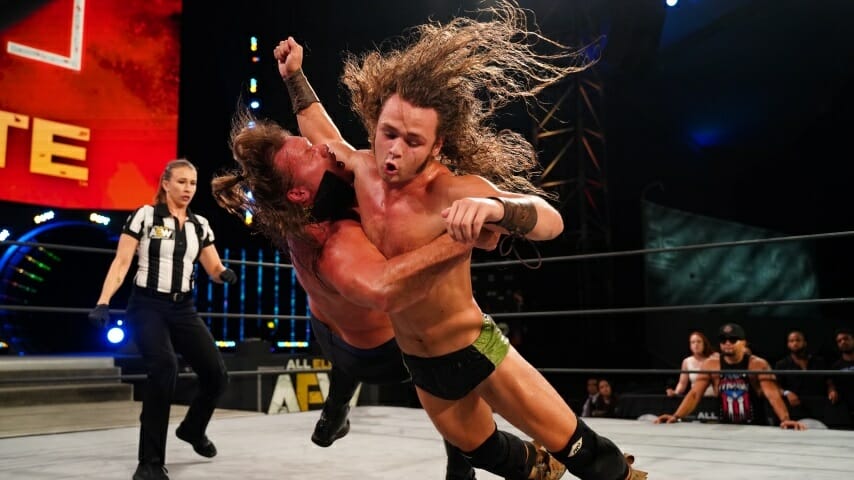
Network: TNT
Last Week’s Ranking: Not Ranked
This Week: A huge hit with wrestling fans.
Want to know what makes for a great wrestling show? Seek out last week’s episode of AEW Dynamite, which airs on TNT on Wednesdays at 8 p.m. ET. The first hour, especially, is getting praised far and wide online as one of the best hours of wrestling on TV in years. The surprise appearance of indie scene lifer Eddie Kingston, who routinely delivers the kind of brilliant, no-nonsense promos that can make any wrestling match seem as real and important as an NBA championship game, kicked off a show packed with fantastic promos, a few hot angles, and brutal, action-packed matches. The first hour didn’t let up, flowing from one great segment to the next, from 24-year-old superstar MJF dominating enhancement talent Griff Garrison in a way that got both over, to anti-authority wildman (and AEW World champ) Jon Moxley saving emo skater savant Darby Allin from the new heel group of Taz, Bran Cage and Ricky Starks. Dr. Britt Baker continues to establish herself as the most improved character of 2020, and one of the funniest people in wrestling, and the Young Bucks and the Butcher and the Blade had an epic brawl for the ages. Lance Archer even threw a dude through a roof. And that was all in just the first hour of a two-hour show; I didn’t even mention the great main event, Hangman Page’s continued transformation into an absolute top star, or the surprise return at the end of the episode. It’s valid to criticize pro wrestling for running events consistently during the pandemic, even without fans and with AEW’s ample testing of its crew; there’s not much to criticize about AEW’s shows from a quality perspective, though, with last week’s episode being the best possible example. —Garrett Martin
3. The Alienist
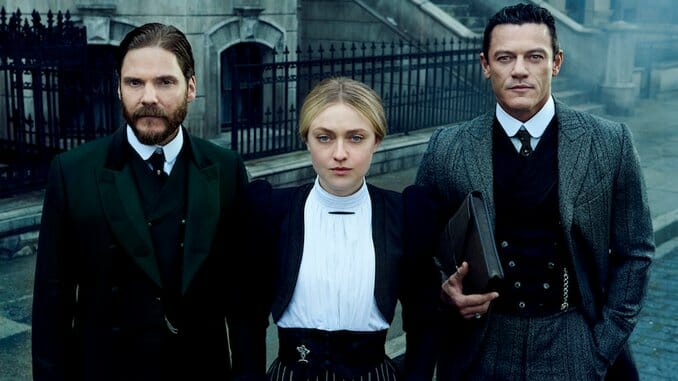
Network: TNT
Last Week’s Ranking: 3
This Week: A bloody delight.
The second season of TNT’s dark crime drama The Alienist, subtitled Angel of Darkness (after the novel of the same name by source author Caleb Carr), improves its storytelling significantly while maintaining one of the most interesting aesthetics on air.
A year has passed since the events of the first season: It’s 1897 and Dr. Laszlo Kreizler (Daniel Brühl) is back as your great-great-great-grandpappy’s criminal psychologist AKA alienist. The blessings of history have sent Teddy Roosevelt (a weak link from last season) out of the picture, having been appointed Assistant Secretary of the Navy. That leaves The Alienist’s Ye Olde Mystery, Inc. firmly in the hands of its central trio. Intense, driven Sara Howard (Dakota Fanning) now runs her own detective agency while timid, fidgety John Moore (Luke Evans) hangs on her every word, writes at the New York Times, and falls deeper into high society politics. The season wastes no time assembling the squad, which must solve a rash of baby-nappings.
Period props, along with various maps, photos, scientific instruments, and other tactile 1890s ephemera only enhance this visually-driven production, one that seems to give its lead a new, out-of-control hat and shirtwaist in every scene. The props are upsetting, the staging is nerve-wracking, and the shot choices are often unsettling. Angel of Darkness looks so lush you’ll think robber barons were behind it.
Flashes of police brutality and corruption in the news industry supplement a story of cyclical injustice and violence, but with so much going on, it’s easy for aspects to feel underdeveloped. However, I still wanted more. By pushing a more layered story to its limits and maintaining its exquisite art direction, The Alienist’s second case is starting to show gold beneath the gilt. —Jacob Oller
2. Agents of S.H.I.E.L.D.
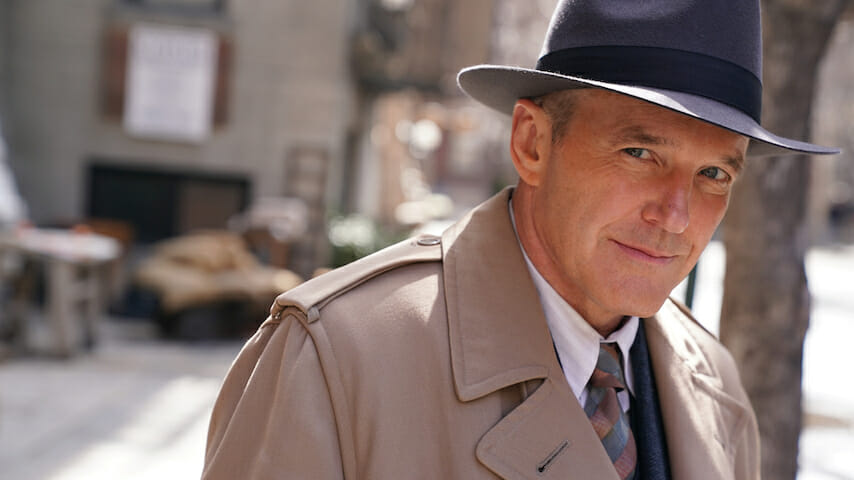
Network: ABC
Last Week’s Ranking: Not Ranked
This Week: We loved a time loop episode! The repeated title card bit was especially nice.
It’s almost a marvel (sorry) Marvel’s Agents of S.H.I.E.L.D. has lasted as long as it has. Hydra has come and gone; the Inhumans have come and gone; even the inimitable Agent Peggy Carter (RIP) has come and gone. Agents of S.H.I.E.L.D., though—it’s held on. More than that, in its quiet way (quiet, at least, relative to the greater MCU), it’s thrived. The cast’s palpable family chemistry can be thanked for much of that—the paternal bond between Clark Gregg’s Coulson and Chloe Bennet’s Daisy is especially lovely—but just as important has been the fact that every season that S.H.I.E.L.D. has defied ratings odds and come back, it’s been to a completely different kind of genre landscape than it left behind. From spy vs. spy to mutant family drama to alien horror story, time loop apocalypse and long haul space adventure, Agents of S.H.I.E.L.D.’s greatest weapon has always been its ability to evolve, adapt, and keep things fresh.
But while each of the series’ previous six seasons have been plenty entertaining (the occasional episode rising, even, to dazzling), it’s only now, as it’s gone full-on pulpy time-traveling mystery/costume drama for its seventh (and final) season, that Agents of S.H.I.E.L.D. has reached the kind of gleefully bonkers heights that have made other franchise oddballs like Legends of Tomorrow (of the Arrowverse) and Legacies (of the TVD-verse) so consistently fun to watch. Like, Daisy, Yo-Yo and Mack dressed up to blend in at a 1931 speakeasy run by a mustachioed Patton Oswalt? Please! How about Simmons infiltrating an Area 51-esque base circa 1955 dressed up as S.H.I.E.L.D. Director Peggy Carter, only to be found out by Agent Carter’s own Daniel Sousa (Enver Gjokaj)? Or LMD!Coulson getting knocked so cold he wakes to a 1950s noir world, complete with black and white graphics and a hard-boiled inner monologue? What about Sousa getting plucked from his should-have-been death in 1955 to go time traveling to the ‘70s with the rest of the team on the Zephyr, only to turn into a real old man yelling at clouds at his first sight of Daisy in bell bottoms, hacking Hydra with her tiny computer? Yes, yes, and oh heck, yes. Add in bespoke, era-appropriate title cards and/or opening sequences—detective noir; sci-fi pulp; 70s action drama—and you’ve got the kind of farewell season most series could only dream of.
Where—or rather when—the rest of the season will end up is anyone’s guess (although a quick glance at upcoming episode titles suggests a Bill and Ted homage might be right around the corner), but wherever (slash, whenever) it goes, it’s bound to be fun. And this summer especially, that’s just what Marvel fans need. —Alexis Gunderson
1. The Baby-Sitters Club
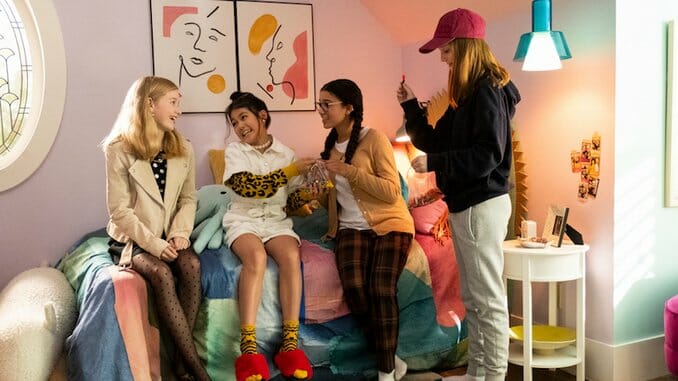
Network: Netflix
Last Week’s Ranking: 2
This Week: In its final week on our Power Ranking, we agree: TBSC 4 life.
Longtime fans of Ann M. Martin’s The Baby-Sitters Club, a chapter book series whose late ‘80s/early ‘90s aesthetic is so iconic Scholastic sells a tin-boxed set of original covers, will be understandably skeptical of Rachel Shukert’s upcoming Netflix adaptation. It seems impossible, after all, that anyone could pluck Kristy, Mary-Anne, Claudia, Stacey and Dawn from their perch in Claudia’s pre-Y2K bedroom, drop them square in the age of Instagram, and not lose something in the translation. I mean, the whole idea behind the Baby-Sitters Club—five girls gathering around a landline phone for half an hour, once per week, to field neighborhood baby-sitting requests as a quasi-socialist collective—is just so deeply analog. And 2020? It’s just so… not.
Well, I am happy to report: Skeptics need not fear. As clever, tender, and earnest as you remember The Baby-Sitters Club books to have been whenever you first read them, Shukert’s vision more than rises to the challenge. Between her confident translation of Martin’s original characters, the natural-but-goofy cinematic language brought to the table by Lucia Aniello and a raft of other (mostly female) directors, plus the endless charm of the series’ young core cast, this newest adaptation is a dream. Like its namesake, The Baby-Sitters Club (Netflix edition) is funny, sweet, and emotionally complex. Just as importantly, though, it implicitly understands the ways in which Kristy’s retro baby-sitting club business model is a perfect analog solution to a whole sea of problems caused by digital technology(/the gig economy)’s stranglehold over modern society.
Smartly, one thing Shukert doesn’t update in this adaptation are the structural elements most signature to the original series. Of the ten episodes the comprise Season 1, the first eight mirror their chapter book counterparts, alternating between the five core sitters’ perspectives, with two episodes each being told from Kristy, Claudia and Stacey’s points of view, and one each from Mary-Anne and Dawn’s. The two-part season finale, meanwhile, mirrors the super-sized Super Special books that functioned, in the original, as a series within a series, taking the girls away from their baby-sitting duties and letting them share the narrative focus equally. For readers, these Super Specials were objects of intense anticipation; for viewers, following Elizabeth and Watson’s big wedding celebration in Episode 8, “Welcome to Camp Moosehead” (Parts 1 & 2) caps off what was already a narratively complete season in the most emotionally satisfying way. Should the pop culture fates conspire in our favor, though, this will be just the first of many clever and tender seasons of The Baby-Sitters Club to come. —Alexis Gunderson
For all the latest TV news, reviews, lists and features, follow @Paste_TV.







































